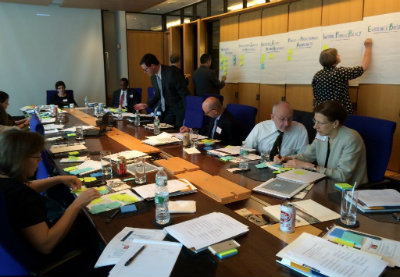 Funders share information on investments in palliative care at the recent convening spearheaded by the Hartford Foundation.
Funders share information on investments in palliative care at the recent convening spearheaded by the Hartford Foundation.Palliative care is an essential component of care for the seriously ill. Yet, the term is often misunderstood by policymakers, the public, health care providers, and, no surprise, even those in philanthropy.
The John A. Hartford Foundation has been a longtime supporter of the spread of high-quality palliative care through its funding of the Center to Advance Palliative Care (CAPC), led by Diane Meier, MD (see Celebrating CAPC and Our 500th Blog Post!). Dr. Meier often refers to palliative care as an “extra layer of support” for the seriously ill and their families.
Regular followers of our Health AGEnda blog also know that I personally advocate for palliative care while sharing my own cancer diagnosis to demonstrate the power of palliative care to improve health, care, and cost (see the article I wrote for Health Affairs, Living Life in my Own Way—and Dying That Way as Well).
To support the advancement of the field of palliative care, this past July the Hartford Foundation spearheaded a national funders convening comprised of 20 funders engaged or interested in palliative care, representatives of Grantmakers in Health, Grantmakers in Aging (well, our own Chris Langston is chair of the board) as well as the local funders affinity group, Philanthropy New York. Speakers included Dr. Meier and the head of the Social Impact Exchange, Alex Rossides, who shared a developing collaboration aimed at scaling up CAPC’s efforts.
[gallery columns="2" link="file" ids="9134,9135,9136,9137"]
The Hartford Foundation values partnerships and takes an active role in developing collaborations that advance the health and health care of vulnerable older adults. In fact, “Spreading Innovation Through Collaboration” is the theme of the Foundation’s 2013 Annual Report. Our experience shows us that we need to understand and learn from each other in order to forge real partnerships in philanthropy.
At the convening, Dr. Meier detailed what we know today about palliative care, the status of hospital-based palliative care, and the emergence and growing need for palliative care in nursing homes, home care, primary care, and specialty care to meet the demands of an aging population. Participants shared their national, regional, and local efforts to address issues relating to workforce, access, and awareness, as well as to inform policy.
The innovations shared were stunning. And, despite the fact that most of the participants have long supported the field and worked with each other, no single person knew the range of activities and innovations we shared that day. Some had never considered how our efforts fit together. For example, the training and resources provided by CAPC were essential building blocks for many local advances.
The broad base of funders attending the convening left knowing a lot more about the field of palliative care, CAPC’s work, and scaling efforts through the Social Impact Exchange. The participants also recommended the establishment of a national funders’ special interest group focused on palliative care.
Based on the recommendation, a pre-conference session for funders on palliative care will take place at the Grantmakers in Aging Annual Conference in San Francisco on Wednesday, Oct. 22, from 8:30 a.m. to 11:30 a.m.
And … we have an extra special treat to share about the pre-conference session! The new head of the California HealthCare Foundation, Dr. Sandra Hernández, will be speaking.
One of the most important roles a foundation can play is to serve as a convener, creating the space for people to learn, share, and refine their efforts in support of an issue. And there is no issue more important than palliative care.
Special thanks go out to dear Kate O’Malley of California HealthCare Foundation, Alex Rossides of the Social Impact Exchange, and the ever amazing Diane Meier of CAPC for their help with the convening. And thank you to GIA and the pre-conference planning committee members, O’Malley and Nancy Zionts of Jewish Health Foundation of Pittsburgh.
